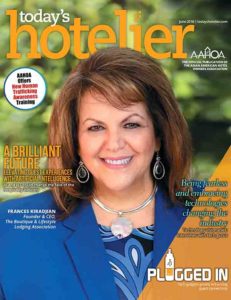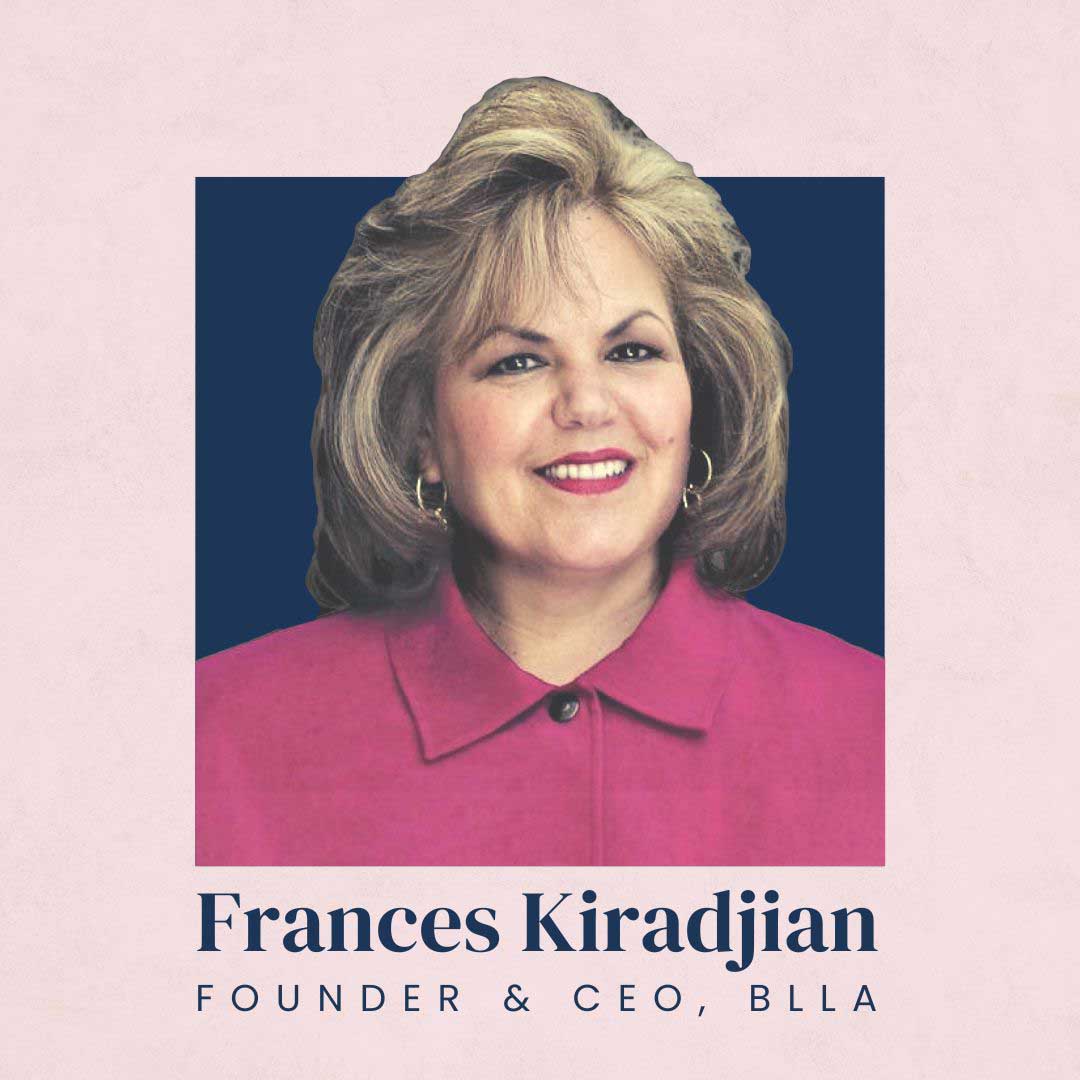CATEGORIES
Entrepreneurship | People We Admire | Women EmpowermentOverview:
- Frances Kiradjian talks about her childhood and her journey in the hospitality industry.
- She emphasizes the importance of maintaining an open mind and not judging ideas too quickly, as some might resonate later in life.
- Her early marriage and motherhood propelled her into adulthood, fueling her passion for supporting young women.
1. Could you tell us a bit about your childhood and how you found yourself becoming a 3 times top 100 person in Global Hospitality by the International Hospitality Institute?
I grew up in Cleveland, Ohio, and moved to Los Angeles when I was 11. Transitioning from the Midwest to California was exciting, especially as a child. Flying over Los Angeles, you see swimming pools, Disneyland, and the allure of the entertainment industry. This environment inspired my early dreams of becoming a movie star and gave me a lot of confidence. Soon after arriving, I got married young and had a child, which thrust me into adulthood early.
My involvement with my daughter led me to care deeply about supporting girls, and I became the head of the Indian Maidens, similar to Brownies or Girl Scouts. I took on leadership roles, like organizing fundraising events, and quickly learned how to raise capital, engage people, and market effectively. These experiences in volunteering became my informal education before I attended college later in life.
I began working in the aerospace industry and was fortunate to have women in leadership positions as my mentors. They became my inner circle, offering advice and support without judgment. One of these mentors, now 93, remains a dear friend of mine. Their guidance highlighted the importance of having a supportive network in one’s life—a personal “board of directors,” to help navigate your career as well as life’s twists and turns. This board can include anyone who believes in you and offers encouragement, from best friends to admired professionals.
2. Considering the fact that your network welcomes more passionate entrepreneurs, businesses, and purveyors, we wanted to ask whether you’ve had any mentors and how they have influenced you.
One of my first jobs in the travel industry was with Carlson Travel, one of the world’s largest travel agencies. They owned the Radisson Hotel Group, TGI Fridays, and numerous other businesses.
When Kurt Carlson retired, his daughter Marilyn Carlson Nelson was appointed CEO of Carlson Companies, I remember attending my first managers’ meeting. I found myself in awe of her style, grace, and confidence as she stepped into her father’s powerful role. Despite her limited experience, she carried herself with pride and became an inspiration to me. She became a mentor from afar. I watched her closely, admired her, and took every opportunity to speak with her at meetings. I would send yellow flowers to her room at conferences to express my gratitude for her influence. She taught me so much by example. I will always consider her my mentor.
3. Your journey in the hospitality industry has been truly remarkable, especially with your pioneering work in boutique lifestyle hotels. Can you share a pivotal moment or experience that fueled your passion for this sector?
Before founding BLLA, I co-owned a company that had a well-established 24-hour call center that provided travel services globally 24/7 to the corporate clients of the firm’s 500 travel agency customers. I came in as a partner to create a negotiated rate consortia hotel program for these customers and their clients which entailed identifying key executives at major hotel companies around the world and negotiating not only favorable rates but also partnering with the chains and brands as their marketing arm to this key clientele. My role was to create an outstanding program while building relations with the hotels themselves, the travel agencies and groups of agencies, and various other complimentary services.
My dedication to relationship-building and straightforwardness set me apart from competitors, earning me a strong reputation in the industry. After about ten years building this business, independent boutique hotels began reaching out for support. Unlike large chains with centralized resources, these smaller hotels lacked guidance. Recognizing this gap, I decided to create an organization dedicated to supporting boutique hotels. Upon selling my shares in the call center/consortia hotel company, I began developing BLLA while juggling the new CEO role following the sale of the company.
In 2009, I officially launched BLLA after discussing the concept with leaders of boutique brands like Kimpton and Joie de Vivre. Their enthusiastic support confirmed the need for such an organization. I promoted BLLA at the World Travel Market in London that same year, gaining hundreds of new hotel members who believed in the mission of the new organization.
One notable early call was from a hotel owner in Paris needing help with a tax issue. This highlighted the global need for our support and solidified my commitment to assisting boutique hotels worldwide. My experiences with CCRA, the consortia program, taught me the value of being a resource for others, even amidst very strong competition.
Helping others generously has been a guiding principle throughout my career. Building relationships and offering support not only strengthens your reputation but also creates a network of mutual aid. This approach has always paid dividends, both personally and professionally. My motto is to always take the time to help others, as every small act of kindness can make a significant difference in someone’s life, fostering a sense of community, and creating a ripple effect of positivity that extends far beyond the initial gesture. So just do it.

4. Can you speak on the impact of gender diversity in your industry and the significance of providing platforms for women to excel and lead?
I’ve always been passionate about supporting women. Being involved with the YWCA’s Indian Maidens group sparked my interest in women’s organizations. Eventually, I reinvented the Los Angeles chapter of Professional Women in Travel, re-establishing it in 1987. Our first event drew 100 women and featured the Executive Vice President of Estee Lauder as our keynote speaker. This event marked the start of building a strong community in Los Angeles.
Later, our chapter joined the International Federation of Women’s Travel Organizations. This global group offered incredible experiences, like attending conferences with delegates from around the world and discussing how different countries supported women. I carried this momentum forward and, in 2007, founded the Travel Industry Executive Women’s Network (TIEWN) after discovering the federation had disbanded.
Launching TIEWN allowed me to continue my mission of supporting women in travel, tourism, and hospitality. Today, TIEWN boasts over 13,000 members worldwide. I personally approve and welcome each new member to verify their background in the industry as well as offer a very warm greeting to our community. The network provides programs, resources, and an annual conference, now in its 11th year.
I’m dedicated to elevating women leaders and giving them opportunities to speak and lead. The rise of the #MeToo movement and the emphasis on diversity, equity, and inclusion have highlighted the importance of our work. We continue to champion these values, supporting women to be leaders and helping others along the way.
My younger daughter became an executive of the company after college and has recently joined me as co-CEO of the entire BLLA organization and its 5 divisions, bringing fresh energy and global insights to our conferences. Our events are unique, blending professional development with personal growth, which has been embraced by our community. We now host three main conferences a year, alongside many smaller events, and for TIEWN events as well as BLLA’s, we ensure diverse speakers are included equally on the stages.
5. In the boutique lifestyle hospitality sector, how do you strike a balance between innovation and tradition? How has this strategy impacted your continued success and relevance in the industry?
We are leading the way for independent boutique hotels. Our conferences include sessions like “The Art of Innkeeping,” which blends traditional innkeeping with modern elements like regenerative F&B, wellness and sustainability, and technology including AI. We recently launched the BLLA Luxury Academy, emphasizing that even a three-star hotel can present and operate with five-star standards. It’s about delivering exceptional service, impeccable online presence, and top-notch training for employees. Boutique hotels have the freedom to innovate without a large corporation dictating their choices. They can quickly adopt new technologies, such as mobile check-in options, enhancing the guest experience. Inspired by my Carlson days, we empower employees to adopt a “yes, I can” attitude, solving customer problems creatively and effectively.
Our conferences cover a range of topics, including hospitality investment and hotel ownership. Historically, independent boutique hotels struggled to secure funding, but this has improved, especially post-pandemic. More investors now recognize the appeal of unique, customer-centric properties. Our 2024 Boutique Hotel Investment Conference will focus on these opportunities and many more. We provide boutique hotel owners with essential resources, from education to vendor discounts. Additionally, we promote their hotels through our consumer direct-booking channel, Stay Boutique.
Our conferences highly encourage open dialogue, allowing participants to ask questions and share insights freely throughout the day. We foster a supportive environment focused on their success, ensuring they feel valued and empowered.

6. Could you please share any significant challenges or failures you encountered along the way, and how you overcame them to eventually reach the level of success and recognition you currently possess?
There are always challenges with an association, particularly with events. Our events are crucial for bringing people together and discussing unique topics not covered elsewhere. Initially, my daughter and I decided to invite speakers from outside the industry to inspire independent, creative thinking. We brought in experts from music, art, fashion, and retail, such as John Varvatos, a high-end fashion designer, Todd Carmichael, the Co-founder of La Colombe coffee, and Arianna Huffington, CEO of Thrive, the author of 15 books, and the Founder of The Huffington Post (purchased by AOL). Although some questioned this choice, believing these speakers were unrelated to the hotel industry, we knew that their innovative perspectives were invaluable. The customers frequenting these unique retail and wellness spaces are the same ones staying at boutique hotels.
We also published a magazine, StayBoutique, featuring city guides that included not just approved boutique hotels but also local independent establishments. These guides highlighted the full boutique lifestyle experience. Initially, some feedback suggested we shouldn’t feature non-industry businesses. We considered this but then COVID hit, and perspectives shifted. Recently, I was thrilled to hear someone request we bring back those diverse voices. Independent hoteliers thrive on creativity and outside-the-box thinking, so our decision was validated. It also demonstrated that we are visionaries and leaders, relentlessly pushing boundaries with unapologetic enthusiasm and positive energy.
Boutique brands, whether in fashion, music, or retail, are now increasingly launching their own hotels, such as the couple from HGTV, Chip and Joanna Gaines, or Christian Louboutin. These ventures are about maintaining brand control and showcasing unique visions, something big chains can’t offer. This is the essence of the boutique and lifestyle sector: creativity and innovation. Our events, with their diverse speakers, truly reflect this dynamic spirit.
7. How did your experiences managing travel budgets for major companies like Disney and Toyota shape your approach to entrepreneurship in the travel and hospitality sectors?
Reflecting on those years, I realize how transformative they were for me. Working in the travel industry, particularly as a national account manager, brought me down to earth, dealing with real people who had specific travel needs. At Carlson Travel, we had in-house travel agents stationed at various corporations, such as Toyota Motor Sales North America and Disney. I even had a desk at both Toyota USA headquarters as well as across the street from Disney Headquarters. At Disney, I was required to attend Disney University to understand their unique culture. At Disney, I also had the incredible experience of sitting in Walt Disney’s chair during meetings at the Burbank lot, witnessing the creativity of Disney and all their divisions including Disney Imagineering.
At Toyota, I worked closely with staff at all levels, including the CEO, to manage their substantial travel budget. My role involved negotiating with corporate card programs, airlines, hotels, and car rental companies, ultimately saving Toyota significant amounts of money without compromising their travel quality. This achievement earned me an award as well as the front cover of Corporate Travel Magazine with the Carlson Travel campaign “We Prove What We Promise.”
These years taught me the art of skillful negotiation and the importance of building relationships. I worked with various corporations, managing their travel needs and coordinating incentive travel programs, which involved planning large events for top-performing salespeople. A memorable moment was when Toyota was considering switching agencies. To retain their business, I created a fun video with our on-site team expressing our love for working at Toyota. This outside-the-box thinking helped us keep the account. These experiences taught me the value of confidence, creativity, and looking beyond one’s immediate focus. Exposing yourself to different fields—music, art, entertainment—can provide fresh ideas. I regularly listen to Masterclass, gaining insights from experts and celebrities from all walks of life. By staying open to new ideas and learning from different industries and genres, you can bring innovative ideas to your own work and ultimately expand your life experiences.
8. What inspired you to establish CCRA, and what lessons did you learn from building and eventually selling this travel agency consortia in 2005?
I was invited by the owners of a 24-hour call center, which served over 500 travel agencies, to explore the idea of a negotiated rate hotel program. This program aimed to secure better deals for thousands of corporate and leisure travelers using these agencies. From this concept, CCRA was CCRA, and I made it my own brand and ethos.
One of my key strategies was creating unique marketing materials. For instance, I used the color purple for our hotel books, which featured all the hotels we partnered with (so a very thick book). Even today, people tell me they still keep these books on their desks, drawn in by the distinctive color and luxurious design. Success required having a clear strategy and the support of my team. I often had to convince them to take risks, like trying a new approach for a few months to see if it worked. Observing competitors and striving to outperform them was crucial. I quickly realized that travel agencies often grouped together, sometimes forming alliances of up to 800 agencies. I would pitch our hotel program and call center services to the leaders of these groups, focusing on building strong, hands-on relationships. I didn’t do this at my desk, but by meeting these executives at their place of business as well as various industry events.
I traveled extensively to meet with clients, demonstrating my commitment to their success. This approach not only established our organization as highly interested in their needs but also built my reputation with key executives. These relationships were instrumental in growing the organization over 13 years and eventually finding a buyer for the company. The relationships we built ensured that our clients gave us excellent reviews, which was vital for potential buyers assessing our reputation. This experience taught me how to run an organization independently, which gave me a huge amount of confidence to build my next passionate venture, BLLA.
Interestingly, I began developing BLLA while still at CCRA. When I left, I negotiated to take BLLA with me as part of my exit package. BLLA stands for Boutique Lifestyle Lodging Association, coincidentally also a four-letter acronym like CCRA. My time at CCRA was invaluable, allowing me to meet incredible hoteliers worldwide and focus deeply on the hotel industry. Now, with BLLA, our focus has expanded to include a broader range of industry participants, but those foundational experiences continue to guide our approach.

9. What’s a current trend in the boutique movement that excites you, and how do you plan to adapt to these trends?
The industry is always evolving, and in recent years, we’ve seen some boutique brands sold to larger chains. When you consider there are around 30,000 boutique hotels globally, the sale of 30 properties isn’t significant in the grand scheme. However, it does reflect broader trends. Many owners, due to age or opportunistic offers, decide to sell their small brands. While we may feel a twinge of sadness when they leave, the boutique space is continually rejuvenated with new hotels and small brands.
Trends are constantly evolving, particularly in the independent hotel sector. While chains continue to introduce numerous sub-brands, often causing customer confusion, boutique hotels stand out by offering a clear and distinct experience with the bonus of being independently owned. By embracing luxurious programming, the ultimate in customer care, paying attention to technology and smart design including in F&B, these boutique hotels are well-positioned to thrive. We see this in the increasing interest from investors in independent hotels, particularly through our Boutique Money Group division and at our Investment Conferences. More hotel projects are emerging that prefer to remain independent or work with boutique hotel operators and management companies.
Many management groups that handle both chain and independent hotels are seeing growth in the independent sector. Instant loyalty programs are also becoming crucial, ensuring customers feel valued regardless of how they book their stay. Interestingly, many independent boutique hotels avoid using online travel agencies (OTAs), opting for direct bookings to retain more revenue. This independence can enhance the value of a boutique hotel. This is demonstrated by a notable sale last year where the Sixty Soho Hotel, a boutique property, sold to another boutique brand (Standard Hotels) for $1.2 million per room. Ultimately, while trends and ownership structures may shift, the essence of boutique hotels—offering unique, personalized experiences—remains strong. This distinctiveness is what many in the industry aim to emulate.
10. What do you think is the key to your success?
One key to success is maintaining an open mind and not judging ideas too quickly. It’s essential to give suggestions some time, as they might resonate later. This open-mindedness has been crucial for me over the years. I’ve always been receptive to new ideas, even while running BLLA with my daughter Ariela. I’ve allowed her to explore and make mistakes, as it’s a valuable way to learn. Being open to new ways of thinking is vital, especially as times change. As I matured, I made a conscious effort to stay updated with the world. It’s not like it used to be, and adapting is crucial. Keeping up with changes through various means, from taking Masterclass courses to attending and speaking at conferences, has been incredibly valuable. Reading different magazines, especially art magazines, has also been a great way to gain new insights. These ideas can often be applied to my work, enriching my approach and keeping me in tune with current trends. Art, design, food, travel & adventure, and wellness are all pillars of my creativity throughout my life
Conclusion:
Frances’ journey from being a newcomer to a global changemaker in hospitality is something to learn from. Her success over the years in providing exceptional hospitality experiences demonstrates her excellence and commitment to adapting to change while staying rooted in tradition.


